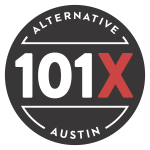KROX-FM
 |
|
| City | Buda, Texas |
|---|---|
| Broadcast area | Austin-Round Rock metropolitan area |
| Branding | "101X" |
| Slogan | Alternative Austin |
| Frequency | 101.5 MHz |
| First air date | November 13, 1984 |
| Format | erp = 12,500 watts |
| HAAT | 258.1 meters |
| Class | C2 |
| Facility ID | 54659 |
| Callsign meaning |
K ROX (as in Rocks) The X is used in "101X" brand |
| Former callsigns | KGID (1984-1990) KOKE (1990-1995) |
| Owner |
Emmis Communications (Emmis Austin Radio Broadcasting Company, L.P.) |
| Sister stations | KBPA, KGSR, KLBJ (AM), KLBJ-FM, KLZT |
| Webcast | Listen Live |
| Website | 101x.com |
KROX-FM, a.k.a. 101X, is an alternative rock terrestrial radio station in Austin, Texas, United States. It is owned by Emmis Communications. The station has studios along Interstate 35 in North Austin, and the transmitter site is located at the West Austin Antenna Farm.
The facility first received a construction permit and was assigned call letters KGID on May 10, 1984. The call sign was switched to KOKE on April 6, 1990.
The station now known as 101X signed on as "Austin's New Rock Alternative" on June 8, 1995.
The original airstaff included Sara Trexler, former KNNC (Austin's original commercial alternative radio outlet) personality Rachel Marisay, LA Lloyd Hocutt, Butthole Surfer Gibby Haynes, KNNC ex Ray Seggern, Austin Chronicle critic and Z-Rock Austin personality Andy Langer, and more. The morning show, "Jason and Deb," won the 2014 Austin Chronicle "Best Of" Poll.
101X veered into active rock territory at the height of alternative's TRL-friendly nu-metal period of the late-1990s. It has since returned to a broadly appealing alternative presentation, closely associated with local Austin music and the more popular front of today's indie-rock.
As of December 30, 2014, Emmis has filed for a construction permit to increase the effective radiated power of KROX-FM to 86 kilowatts as well as an increase in elevation to 320 meters. This upgrade is expected to increase the coverage area of KROX-FM significantly, reaching from Georgetown to the north, and as far as Gonzales and Seguin to the south. San Antonio coverage is expected to be marginal at best, only reliably covering the northern and northeastern suburbs of the San Antonio metropolitan area.
Coordinates: 30°19′19″N 97°48′04″W / 30.322°N 97.801°W
...
Wikipedia
